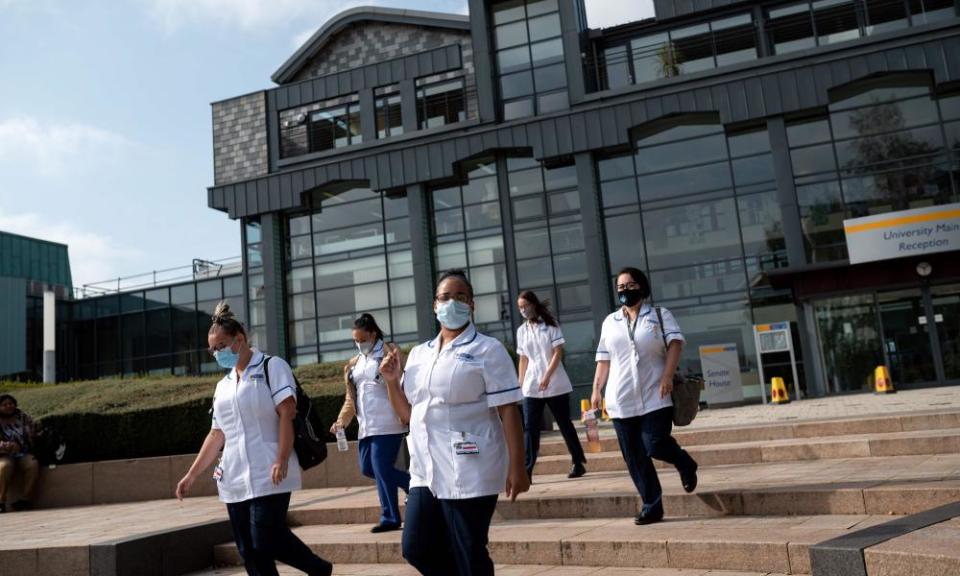Student nurses on Covid placements in UK call for return of paid NHS contracts

Student nurses are calling for paid contracts to be reinstated for those on placement in hospitals in the UK, saying they feel “forgotten about” during the second wave of Covid-19.
In March, final-year student nurses in the last six months of their degree were offered the option to join the NHS workforce under paid contracts. Other final year students and those in second year could also opt in for paid clinical work.
Paid contracts finished in September as pressure on the health service eased, and there are no plans to reintroduce them in any of the four nations of the UK.
As admissions to hospitals rise this winter, many student nurses are now being drafted in to help on Covid wards. In England and Scotland, their student status also means they are not automatically eligible for the death-in-service benefits that paid NHS staff receive.
“During this wave, nothing has been discussed, nothing has been on the news, it just feels like we’ve been forgotten about,” said Emily Cooper, 26, a second-year student nurse in Leicester working on a general ward for elderly patients, which is seeing a rising number of Covid cases.
“Death rates are higher and the cases in hospitals are higher, and we’re in lockdown again, so we feel hard done by because we’ve not got any protection or any kind of financial payment. We’re still out there on the frontline, and it’s a really scary time.”
Death-in-service benefits during the pandemic mean the family of staff who die from the virus during the course of their work will receive a payout. “I think it’s an outrage,” said Hannah, a second-year student nurse in Sheffield. “It’s really insulting to suggest that students who give an awful lot shouldn’t be entitled to [death in service benefits].”
Cooper works part-time in a care home to supplement her income, but like many student nurses she has been forced to stop working to reduce the risk of infection, a policy that is leaving many struggling to make ends meet.
Adele is a second-year student nurse in west Scotland working on a Covid ward, which she was given little choice about despite having a two-year-old daughter and a partner with asthma at home, as well as caring for her 85-year-old grandfather.
“I usually work for the NHS bank and have been unable to do this on top of my hours as I am a risk, coming from a Covid ward. So I have lost the additional income I need to help towards my living costs,” she said. “It’s not a good time to be a student in the NHS.”
A Department of Health and Social Care spokesperson said: “We are working to minimise disruption to healthcare courses during this unprecedented situation, and have put in place a range of specific measures for students on placements including access to PPE, testing and NHS help and support services.”
A Scottish government spokesperson said: “We recognise that there are very limited numbers of non-Covid-19 placements, and it will not always be possible to accommodate every student’s requirements. The health of our students is paramount and all universities are being asked to apply the Covid-19 risk assessment, and to discuss and agree the results with students.
“Students who are experiencing financial difficulties can apply for discretionary funding through their university, which can provide assistance with general costs, including housing or travel costs.”
Related: NHS staff face burnout as Covid Christmas nears | Letters
Prof Geraldine Walters, the executive director of professional practice at the Nursing and Midwifery Council (NMC), said:
“Working together with our partners, our emergency standards were withdrawn at the end of September and replaced with our recovery standards. We are confident this will help enable universities to react flexibly where necessary to best support students in their learning, and to help students graduate when expected.”

 Yahoo Finance
Yahoo Finance 